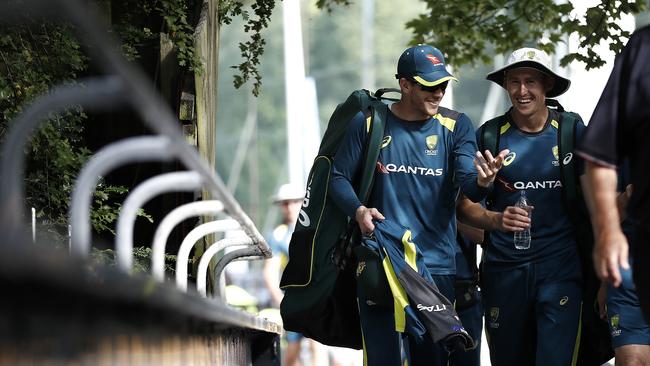
According to Peter Lalor, The Australian’s chief cricket writer, other Aussie tunes were also chosen by Dene Hills, a member of the backroom staff, but it was the Reels’ Kitchen Man that was, inadvertently, the most appropriate for Paine’s unusual situation.
I’m just a man
Cleaning up the kitchen
I do the best I can
To make things right
And I don’t understand
How I got here anyway.
How the 34-year-old came to be Australia’s 46th Test captain, in the heat of the kitchen cleaning up others’ mess, is one of the more remarkable stories in sport. There have been only two Tasmanians given the highest honour in Australia cricket — Ricky Ponting is the other — but Paine is one of a kind. He was appointed in extraordinary circumstances, mid-Test match as an interim captain during a full-blown crisis, and despite his official appointment shortly afterwards, he has never quite shaken off the tag of caretaker leader, looking over his shoulder.
The career trajectories of so many of the young men who will take the field tonight — not least Paine’s opposite number, Joe Root — have been, on the face of it, straightforward. From cradle to crease to captaincy, there has always been a sense of inevitability about Root’s progress and, aged 28, England’s captain sits in the prime of his career.
He is a World Cup winner, one of the best batsmen in the world, growing in stature with the best years to come, if that trajectory is allowed to continue unimpeded. An Ashes win as captain would give him the full house.
Who knows what lies in store, though? Nobody, least of all Paine, needs reminding how quickly things can change in sport, or about the bumps in the road that can derail the best-laid plans.
At 16, Paine was the youngest recipient of a rookie contract as a wicketkeeper for Tasmania. He remains, to most judges, the best, most natural gloveman in the land — someone who Greg Chappell said could have played 100 Tests had fate been kinder. And yet, almost a decade after his Test debut, tonight morning represents only his 22nd start and his second Ashes series.
It is almost forgotten now that he made his debut in a neutral Test against Pakistan at Lord’s in 2010, the same match in which Steve Smith first appeared. Other than Smith, no other Australia player from that Test is still playing first-class cricket. What Australia would give now for that middle order of the Michaels, Clarke and Hussey, and Ponting, a line-up so strong that Smith, primus inter pares now as a batsman, came in at No 8, his flighty (filthy) legspinners as important as his runs.
Smith quickly went on to establish himself as a fine top-order batsman and eventually captain, while Paine’s career became notable principally for its nominative determinism. A badly broken finger in a charity match in Brisbane in 2010 meant that by the time England arrived for the 2017-18 Ashes series down under, Paine had undergone more operations to that finger (seven), and had double the number of pins inserted into it (eight) as he had received Test caps.
Before his return in that series, he was on the verge of being released by Tasmania and taking up a job as a rep for Kookaburra. Now the man who was playing for Banbury in the Home Counties Premier League in 2015 stands at the pinnacle of his sport.
By common consent, he has done a decent job in difficult circumstances, balancing a requirement to remain competitive with restoring the Australian team’s image after last year’s ball-tampering scandal in South Africa. He has formed a strong alliance with Justin Langer, who was an assistant coach when Paine first came into the team and who would often spend more time with fringe players such as Paine, but who is now Australia’s head coach.
A headline in a national newspaper yesterday announced that “restoring national pride is more important than winning the urn”, alongside a piece that wondered whether Paine might be too soft. With Langer sometimes sounding like a new-age guru or one of those characters who actually believes the guff heard on the motivational speaking circuit, and with attention drawn to Paine’s good-natured character in the wake of the behavioural issues that dogged the tour to South Africa, it is easy to see why that mistake could be made.
It would be unwise to underestimate the competitive qualities of both men, or their desire to win.
Paine will not welcome James Anderson to the crease in the manner of Clarke (“Get ready for a broken f … ing arm”) in 2013 but he is unlikely to stand in the way of his fast bowlers trying to inflict the same. Paine and Langer will be as desperate to find weaknesses in England’s team and as desperate to win as Australia sides always are. Paine will just try to do it with a smile.
Both captains will greet each other with something to prove. England will see a chance to niggle away at Paine’s potential weakness, namely the competition for his place in the team. The unique circumstances of his elevation mean that Australia have moved away from a principle that has always underpinned the selection of the captain: he must be a proven performer, a first pick. Greg and Ian Chappell, Allan Border, Steve Waugh, Ponting, Clarke — a lineage of some of the best that the nation has produced.
As a wicketkeeper, Paine is solid. As a batsman, one career first-class hundred (in 200 innings) suggests that Matthew Wade, who is in the squad and is likely to play as a specialist batsman, or Alex Carey, not selected, may not have to wait too long for their chance. The uncertainty over Paine’s place and his future is something that will not be lost on England, as it wasn’t last summer when Paine’s highest score of 15 in a one-day whitewash stood out.
After this week’s news that Root will bat in his less-favoured position at No 3 — absolutely the right move in my view — Australia will sense an opportunity to get at him. Given the fragility at the top of the order, undermining Root would go a long way to ensuring that Australia keep a grip on the Ashes. They will have picked up on his tetchiness after the Ireland Test last week and his suggestion of weariness after the World Cup.
A benchmark for resilience was how Waugh once termed an Australia captain, and their new-ball bowlers will be keen to test Root’s appetite for taking on the captaincy and the No 3 position at the same time in a full-on summer.
Coming so soon after the World Cup, this has seemed like a strange build-up, or non-build-up to the Ashes, but some things do not change. For both captains, there will be the unique scrutiny and pressure that the Ashes brings, six weeks of living and breathing the game and replaying decisions in your mind over and over again.
“There’s Test cricket and there’s Ashes cricket and they are two completely different things,” Andrew Strauss, the former England captain, said recently, a distinction magnified for the leaders.
A more charming, outwardly relaxed pair you could not wish to meet, but they will not be immune from the agonies that all Ashes captains endure.
The Times




On his first morning as Australia’s official captain, the day before the start of the fourth Test against South Africa in Johannesburg 16 months ago, Tim Paine warmed up to the lyrics of a song from the Reels, a quirky indie-rock band from Dubbo in NSW.